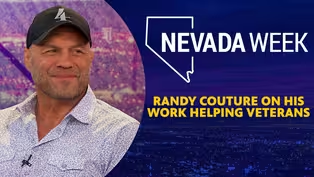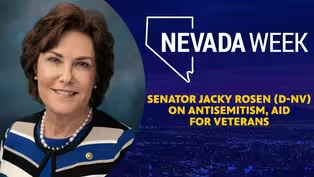
A look at “Imagining the Indian” documentary
Clip: Season 6 Episode 18 | 5m 44sVideo has Closed Captions
“Imagining the Indian: The Fight Against Native American Mascoting”.
“Imagining the Indian: The Fight Against Native American Mascoting” explores the efforts to remove Indigenous names and imagery from sports mascots
Problems playing video? | Closed Captioning Feedback
Problems playing video? | Closed Captioning Feedback
Nevada Week is a local public television program presented by Vegas PBS

A look at “Imagining the Indian” documentary
Clip: Season 6 Episode 18 | 5m 44sVideo has Closed Captions
“Imagining the Indian: The Fight Against Native American Mascoting” explores the efforts to remove Indigenous names and imagery from sports mascots
Problems playing video? | Closed Captioning Feedback
How to Watch Nevada Week
Nevada Week is available to stream on pbs.org and the free PBS App, available on iPhone, Apple TV, Android TV, Android smartphones, Amazon Fire TV, Amazon Fire Tablet, Roku, Samsung Smart TV, and Vizio.
Providing Support for PBS.org
Learn Moreabout PBS online sponsorshipWhile November 11th is Veteran's Day, November in its entirety, is National Native American Heritage Month.
And right now, an award winning documentary is exploring the movement that aims to end the use of Native American names, logos and mascots in sports and beyond.
Maria Silva attended a special screening of the film and joins us in studio.
And Maria, the screening was held at the Palms Casino Resort for several important reasons, and it was definitely a very special evening.
Now, the screening was held on Indigenous Peoples Day at the Palms Casino Resort, as we mentioned, the first casino resort in Las Vegas to be fully owned and operated by a Native American tribe, the San Manuel Band of Mission Indians.
They are also executive producers of the film, Imagining the Indian.
I got the chance to talk to the filmmakers who shared why bringing this powerful film to the big screen has truly been a labor of love.
Six years in the making, my God.
That.
That, to me, is not honoring somebody.
That to me is demeaning.
Imagining the Indian the fight against Native American mascots examines the social movement that is ending the use of Native American names, logos and mascots, especially in the world of sports.
Washington's football team changed its name while we were making the film, and so we had to cover that in real time.
And, you know, we had people come up to us and say, well, well, Washington has has changed their name.
You don't need to make the movie anymore.
And and we said, Well, no, that's not the case for co-director and co-produce, Sir Ben West.
I'm Cheyenne or to Titus, as we call ourselves.
The documentary Very Personal and a Call to Action about 2000 public schools, many of them, most of them taxpayer funded, who have mascots and names.
And we still have three major sports franchises in in the US, that being Chicago hockey, Atlanta baseball and Kansas City football who need who need to to to follow DC's lead and go ahead and make wholesale change.
Imagining the Indian family Affair.
Ben's father, Richard West, founding director of the Smithsonian National Museum of the American Indian, is featured in the film.
It is utterly unidimensional.
They're warriors.
They're very rich class rather than native peoples, as they were even then and certainly are now.
Father and son both made a special trip to Las Vegas to take part in the screening and panel discussion at the Palms Casino Resort.
But I was close enough to it.
I saw it being pieced together through a long period of time.
One thing I'm extremely proud of as a native person myself is the fact that this film really did come out of Indian Country.
You know, I mentioned Simon while Band of Mission Indians.
What I hope happens today is that everyone really understands something new that they didn't know before.
And it's even more important and more impactful that it's on Indigenous Peoples Day at the Casino resort.
That was the first to be wholly owned and operated by a tribe in Las Vegas.
Well, in the documentary and especially during the panel discussion, I'm descended from people who were stolen from their homelands and brought over to this country on slave ships.
And so, you know, I've been involved in trying to support other communities in their fights.
Ally Ship was discussed in detail.
Being an ally is what Drew producer and writer Yancey Burns to the project.
Well, I'm a big believer in empathy, and I think they're going to walk away from this film and they're going to think about the public health impact of these mascots.
They're going to think about the fact that it's not it's not an issue of, you're being too woke or you're being too sensitive or you're just being bothered for no reason or this isn't that big of a deal.
I hope they're going to walk away from this film understanding that this is a public health crisis.
We know from decades of social science research that these mascots and exposure to them lead to increased levels of suicide amongst native people, particularly native youth.
We know they lead to decreased levels of self-esteem in Native people, particularly native youth, and we know that they lead to just generally worse health outcomes for all Native people.
And so I want people to come away from this movie and and if they have someone in their life who loves Atlanta baseball or loves Kansas City football or love Chicago hockey or loves one of these 2000 schools across the country, I just wanted to say to those folks, you know, you know, the public health impact, you know, that it's tangibly hurting people.
And if it was any other race of people, nobody would stand for it.
There's no good reason why the name of a sports team should ever be more important than the health and well-being of people.
We are people first, not Redskins.
We are not scouts, we are not chiefs, we're not squash.
You will see in the film the many voices that that that come out of Indian country.
And it's essential that Native people be tell their own stories.
It's up to native peoples to own their own images, to own their own words, and to be able to own their own feelings.
We have a voice now.
representation matters?
I definitely left inspired.
Now the filmmakers tell me imagining the Indian will go into full distribution next year, and by fall of 2024 they will introduce their educational curriculum, which they are currently creating with PBS's Learning Media.
Amber Thank you, Maria.
And the moderator of that panel, Fawn Douglas, was a featured guest on Nevada Week In Person.
You can watch her interview at Vegas PBS Star organ of the Week.
And I'll see you next week on Nevada Week.
Randy Couture on his work helping veterans
Video has Closed Captions
Clip: S6 Ep18 | 10m 11s | UFC Hall of Famer and veteran Randy Couture shares the work his foundation. (10m 11s)
Senator Jacky Rosen (D-NV) on antisemitism, aid for veterans
Video has Closed Captions
Clip: S6 Ep18 | 9m 23s | Senator Jacky Rosen shares her concerns about rising antisemitism on college campuses. (9m 23s)
Providing Support for PBS.org
Learn Moreabout PBS online sponsorship
- News and Public Affairs

Top journalists deliver compelling original analysis of the hour's headlines.

- News and Public Affairs

FRONTLINE is investigative journalism that questions, explains and changes our world.












Support for PBS provided by:
Nevada Week is a local public television program presented by Vegas PBS

